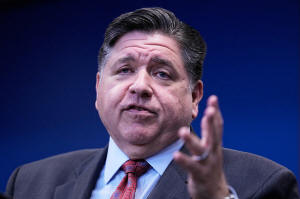Bipartisan US governors' group faces division over Trump's deployment of
troops to states
[October 08, 2025]
By GEOFF MULVIHILL and DAVID A. LIEB
The Democratic governors of California and Illinois are threatening to
leave the National Governors Association because of its silence on
President Donald Trump’s deployment of National Guard troops across
state lines despite objections from the receiving states’ leaders.
“If we cannot come together, on a bipartisan basis, on this basic
principle of state sovereignty, what purpose does the National Governors
Association serve?” California Gov. Gavin Newsom asked in a letter to
the nation's other governors.
The bipartisan governors’ group, founded in 1908, advocates for issues
on which governors find common ground and hosts meetings where they can
exchange ideas. Separate Democratic and Republican governors’
associations take more partisan positions and help finance campaigns.
Newsom and Illinois Gov. JB Pritzker, both potential 2028 presidential
candidates, contend Trump's troop deployments should be a matter of
concern for all governors. But some Republican governors have supported
Trump's actions, and the national governors' group has not taken a
position.
“I’m not sure the policy issue of whether the Constitution allows for
federal involvement in the state and the National Guard is something
that the NGA would want to tackle,” said Republican Missouri Gov. Mike
Kehoe, who co-chairs the organization’s task force on emergency
management and public health.
The Democratic governors of Kansas, Michigan and Minnesota already have
left the NGA this year. Kansas Gov. Laura Kelly said she didn’t think
the roughly $100,000 annual dues paid by the state were a good
investment and encouraged the group to push back against canceled
federal grants.

Some Democrats see Guard action diminishing states' role
The bipartisan governors' organization is far from the first institution
to face division and doubts over how it should respond to sweeping
changes in Trump’s second term. Since returning to office, Trump has
been using executive power in ways that presidents usually don't.
This week, he has attempted to deploy Texas National Guard members to
Chicago and California Guard members to Portland, Oregon, to protect
federal immigration facilities and personnel amid what Trump describes
as out-of-control crime. Democratic officials in those states have sued
over the efforts, as has California. So far, judges have blocked the
deployment in Oregon but haven't stopped it in Illinois.
Newsom and Pritzker have argued the National Guard deployments are not
just a policy difference but an infringement on state sovereignty that
must be condemned.
“The credibility of the National Governors Association — and our
integrity as state executives — rests on our willingness to apply our
principles consistently, regardless of which administration attacks
them,” Pritzker said in a letter Monday to Oklahoma Gov. Kevin Stitt,
the chair of the National Governors Association.
[to top of second column]
|

Governor JB Pritzker talks to media at a news conference in Chicago,
Monday, Oct. 6, 2025. (AP Photo/Nam Y. Huh)

Stitt did not immediately respond Tuesday to a request for comment
from The Associated Press. But he said in a news conference last
month that the group should steer clear of areas where there’s not a
consensus and leave those to the Democratic Governors Association
and Republican Governors Association.
Republican Texas Gov. Greg Abbott, who authorized the call-up of 400
Texas National Guard members, did not immediately respond to a
request for comment Tuesday. On Monday, he posted a cartoon on his X
account showing the Democratic governors of California, Illinois and
New York telling Trump, “LEAVE OUR CRIME ALONE.”
Bipartisan group doesn't always weigh in
The National Governors Association bills itself as a beacon of
bipartisanship, which means it stays out of a lot of the thorniest
battles. Some topics where governors have found common ground
include disaster preparedness, workforce development and expanding
broadband access.
Last week, Stitt and NGA vice chair Wes Moore, the Democratic
governor of Maryland and a possible 2028 presidential candidate,
condemned the then-looming federal government shutdown, calling for
dialogue but not a specific policy solution: “We urge federal
leaders from both sides to work to set aside political games and
pass a budget that reflects the values and promises states commit to
every day.”
But no unity has emerged on Trump's immigration and crime-fighting
policies.
Connecticut Gov. Ned Lamont, a Democrat, said in a statement that
he's opposed to the mobilization but isn't ready give up on the
governor's organization over it. “My hope is that the NGA will
continue to advocate for the best interest of the states,” he said.
Kehoe said no one has asked him to sign onto a statement denouncing
Trump's deployment of National Guard troops to states against a
governor's will. Earlier this year, Kehoe successfully pushed for a
state makeover of the St. Louis Police Department oversight board
despite the objections of the Democratic mayor, citing crime as
justification.
“Certainly Chicago could use some help,” Kehoe said. “I would hope
that Governor Pritzker would welcome help to keep his citizens
safe.”
___
Associated Press writers John Hanna in Topeka, Kansas; Susan Haigh
in Hartford, Connecticut; and Trân Nguyễn in Sacramento, California,
contributed to this report.
All contents © copyright 2025 Associated Press. All rights reserved
 |